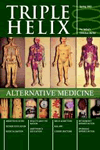Similarly, we no longer want to deal with certain social problems as morally based. Alcoholism, for example, has previously been thought of as a moral problem, but if described as a medical issue gains much more sympathy. The pursuit of a genetic basis for homosexuality seeks to turn another moral issue into a medical one.
Illich also described 'clinical iatrogenesis', the harm done to patients by medical treatments, and 'social iatrogenesis', the effect of making medical 'non-diseases'. The later describes the attempt to make medical something that is not, or 'disease-mongering' as it has become known. Most often this is in order to make money (in the case of drug companies) or to provide legitimacy (in the case of patients or pressure groups).
Issues in patient care
Medicalisation is a difficult issue when talking about patients. The gain in financial, psychological and practical terms of having a recognised illness can be large. Problems such as chronic fatigue syndrome, attention deficit disorder and many others have been suggested as non-diseases. Some of these are more problematic than others. In some instances there is a good argument to be made for the possible harm caused by treating something that may not be an illness. For example, the medical treatment of attention deficit disorder could be sceptically described as 'mass drugging of children.... a displacement strategy for the difficult task of improving family and school life'. Conversely, it is important that patients know that they are being taken seriously and the suggestion that a problem like chronic fatigue syndrome has psychological origins may not be accepted.
The pharmaceutical industry
In the case of pharmaceutical companies the problem is less personal. Targeted 'education' of doctors to increase the exposure of a disease, with the intention of increasing drug prescribing, may well lead to over-treatment with harmful medication as in the case of 'lotronex' for irritable bowel syndrome (after being marketed in this manner, the drug was withdrawn due to serious adverse effects).
Another example of profit-driven medicalisation is viagra. An increase in society's emphasis on sex has increased expectations, and changed what people think is normal in terms of sexual behaviour. Viagra has cashed in on this. The medical treatment of a condition has in part to do with whether there is an available treatment and how serious the problem is. Pharmaceutical companies are producing treatments and then creating or exaggerating conditions to sell them (for example female sexual dysfunction).
Effects on the profession
Another issue in the medicalisation of conditions, is its effect on the profession. In the BMJ there was a weariness amongst doctors, a frustration with a medical service which is asked to shoulder so many of society's problems. The burden on the medical profession from society's inability to deal with fundamental issues of life and death is heavy. The overlap of social problems with medicine asks many of us to work outside our sphere of knowledge and training, or in areas which are less amenable to treatment.
Solutions?
Jesus had no difficulties with going outside any one particular aspect of his work and addressed the whole person; if that meant providing practical items (such as food), emotional support, physical healing, spiritual rebuke or social debate, he did so. When Jesus healed the paralysed man in Luke chapter 5, he did not deal immediately with the man's physical need, but tended first to the pressing problem of his spiritual need for forgiveness. In the same chapter, when healing a leper, Jesus took time to ensure the man would be rehabilitated into society by instructing him to take the appropriate steps to be declared clean.
Although we might want to delineate the boundaries between medical, social and other problems, patients do not often do this. I think that we are obliged to assist as far as we can, whilst perhaps referring to more suitable services. Perhaps we should take this as an opportunity to show the love of Christ and his truly holistic care. Where colleagues may lack the internal resources, we have an endless wellspring of life from God.
In the larger arena, we as the church must provide an alternative answers to life's questions. The Christian Medical Fellowship should continue to be a voice in the medical establishment. In particular we should be prepared to challenge pharmaceutical companies, the media and other groups who wish to use medicine to their own ends. Jesus had no qualms about holding society and its various elements to account and Christian doctors must do the same.
































